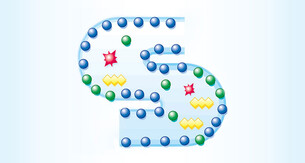During the first few months, breast milk is the only supplier of the most important nutrients a baby needs for a healthy growth. This is why it is particularly important that the mother’s diet is healthy and balanced. Fresh fruit, vegetables, wholemeal products, and fish at least once a week are important in order to supply babies well with vitamins, minerals, trace elements, and vital fatty acids.
According to paediatricians, only vitamin D and fluoride should be given in addition to breast milk as a prophylactic measure. In cases of vitamin D deficiency, the integration of calcium in the bones is impaired and that could cause problems later in life. In our part of the world, where there is little sun in winter and dermatologists advise against intense exposure to sun in summer, babies should daily receive vitamin D in their first year of life.
It is also advisable that fluoride is+ supplemented to reduce the risk of tooth decay.
All important nutrients

LCP (Omega-3 & 6

LCP (Omega-3 & 6) have an important function in the development of the brain, nervous system and eyesight.
LCP fatty acids (or LC-PUFA) are polyunsaturated fatty acids. They have an important function in the development of the brain, nervous system and eyesight. The most important LCP fatty acids for healthy development are arachidonic acid (AA) and docosahexaenoic acid (DHA). These can also be found in breast milk.
Omega-3 is particularly important in infants for the development of the brain cells and nerve cells. Since the brain grows and matures so substantially in the first two years of life,the regular consumption of Omega-3 fatty acids is especially important: 0.5% of the daily energy intake of an infant should be covered by Omega-3 fatty acids.
Natural lactic acid cultures

Breast milk contains different lactic acid cultures that help breastfed infants to develop a healthy intestinal flora. Mothers pass on protective lactic acid cultures to their babies through breast milk. The natural protective cultures in breast milk settle in the intestine and can prevent unwanted or harmful germs from spreading there. Breastfed babies therefore build up a special protective shield, as 70% of the immune system is in the intestine.
Breast milk dietary fibres

Breast milk dietary fibres (breast milk oligosaccharides) serve as food for the protective lactic acid cultures and therefore contribute to a healthy intestinal flora.
Further valuable protective components in breast milk

Babies get additional valuable protective components from breast milk which contribute to their healthy development.
Here are some examples:
- • Antibodies (immunoglobulins) or lysozymes: have a direct effect on bacteria
- • Antioxidants and various messenger substances: help fight infection
- • Lactoferrin: helps the body to absorb iron and is effective against bacteria
- • Not all the functions of some breast milk components are known
- • Many other components have not yet been researched at all





